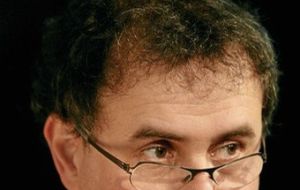MercoPress. South Atlantic News Agency
Economist Roubini warns about “the seeds of the next crisis”
 US consumers are “shopped out” and “burdened out” says Nouriel Roubini
US consumers are “shopped out” and “burdened out” says Nouriel Roubini The US economist widely credited with having predicted the financial crisis has warned we are already “planting the seeds of the next crisis”. Nouriel Roubini told the BBC that he is concerned about the growing gap between the “bubbly and frothy” stock markets and the real economy.
Over the last six months, the Dow Jones Industrial Average has risen about 45%. But Mr Roubini says he sees an economy where consumers are “shopped out” and “debt burdened”.
Based on the run up in share prices in recent months, investors appear to be betting that good times are around the corner. A view not shared by Mr Roubini.
“The crisis is not yet over,” the New York University professor said.
“I see an economy where the consumers are shopped out, debt burdened, they have to cut back consumption and save more.
”The financial system is damaged... and for the corporate sector I don't see a lot of capital spending because there is a glut of capacity.“
Mr Roubini believes US house prices have further to fall, straining America's fragile recovery.
Property prices have already declined sharply. According to the National Association of Realtors, the national median has dropped almost 13% from a year ago to 177,700 US dollars.
Many believe the crises in the residential market could spread to the commercial real estate market causing more headaches for the banks.
So where does the ”froth“ in the markets come from?
Mr Roubini - like many other economists - believes it is engineered by the Federal Reserve and the government which has been pumping cash into the economy to dampen the pain of the recession.
”There is a wall of liquidity cashing assets,“ he said. ”But I think that there is a growing gap between what are the asset prices and the real economy.”
Although he thinks there will be a correction, he believes some of the mistakes of the past can be avoided if reforms are implemented. (BBC)




Top Comments
Disclaimer & comment rulesCommenting for this story is now closed.
If you have a Facebook account, become a fan and comment on our Facebook Page!